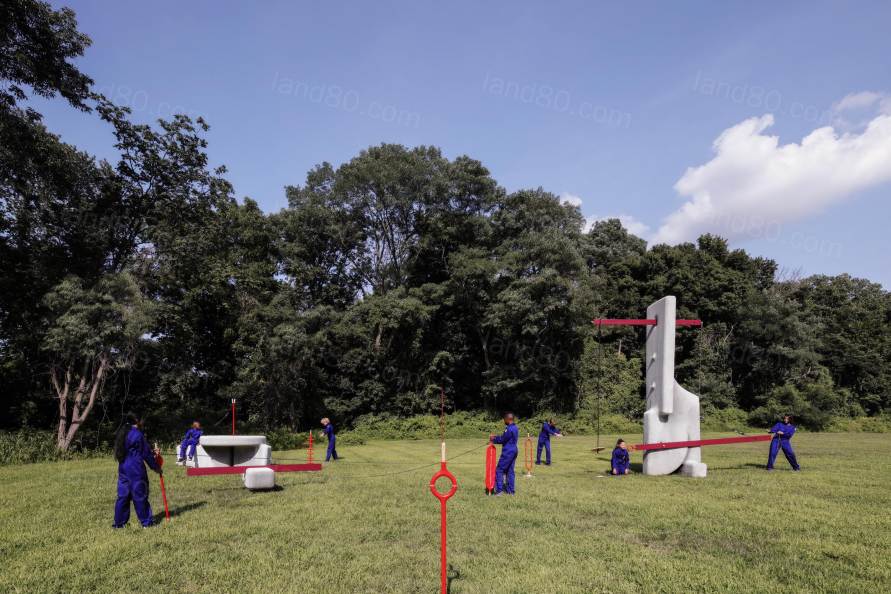Grayson游戏实验室是寓教于乐的典范。在幼儿时期,游戏常与体育运动挂钩,如秋千,滑梯或攀爬架。但年轻人期望以不同的方式运用他们的想象力,通过智力挑战、严格的实验或建设世界。这项实验致力于重新思考游戏与户外教育之间的关系,将下一代培养成为有创造性的思想者。
The Grayson Play-Lab is a model for
integrating play into secondary education. In early childhood, play is
dedicated to physical activities such as swings, slides, or monkey bars. But
young adults deploy their imagination differently; through intellectual challenges,
rigorous experiments, and world-building. This research is dedicated to
reconsidering the relationship between play and outdoor education, encouraging
the next generation of creative thinkers.



Grayson游戏实验室是一系列用于激发想象力的攀爬架,并与Grayson学校的学习课程相结合。一系列奇特的混凝土装置被放置在一个开放的环境中。这些巨大的结构不同于其他游戏装置,脱离了常见游戏结构的可识别颜色,纹理和材料,而是借助一系列锚点,绳索等在标准尺寸的木材上进行改变和扩展。它们经过精心设计,具有强大的承重结构,同时也足够灵活,允许师生们在这里进行拓展活动——测量、物理实验、锚点游戏或求证三角函数等。
The play-lab is a scaffold to fuel the
imagination of the project-based learning curriculum at The Grayson School. An
otherworldly collection of curious concrete characters is situated in an open
landscape. These colossal creatures are unlike other play-structures. The
recognizable colors, textures, and materials of common play structures
have grown up. A series of details provide anchors to tie rope off to, or
receive standard dimensional lumber. They are engineered to accept the maximum
load the students can throw at them, while also flexible enough to allow the
students and teachers to fabricate their own extensions — to take measurements,
conduct physics experiments, anchor a game, or confirm a trigonometry equation.
▽师生们在这里进行拓展活动





这些细节兼顾了实用性与神秘感,同时与学校的课程保持一致。在游戏和户外教育过程中,学生面临的挑战是发现这些设计决策背后的意义,计算他们的坐标位置,并理解设计如何兼顾创新与严格并存的教育逻辑。
These details are practical as much as they
are cryptic, with alignments to themselves as well as the cosmos. These
alignments are developed in concert with the curriculum of the school. Over the
course of their education, students are challenged to discover the meaning
behind these design decisions, to calculate their coordinates, and understand
the logics of how high-design can influence their whimsical but rigorous
education.


为了激发学生们的行动力,团队开发了一系列名为“glyphs”的木制零件,作为游戏实验室的入门套件,如同一个类型的合集,里面的每个元素都是唯一的,但与同一合集里的其他元素共享相似的属性。这些丰富多彩的工具具有维度和形式,表明其实用性,但并不限制使用方式。这种实用性与抽象性的融合旨在激发学生们构建世界的方式。“glyphs”将作为一个系统,其使用范围将随着学生自身语言的发展而扩展。
To spark agency for the students, a family
of wooden instruments, called ‘glyphs’, serve as a starter kit to bring the
play-lab to life. Reminiscent of a type-set, each is unique, but share
properties with their neighbors. These colorful tools have dimensions and forms
that suggest a usefulness without overtly prescribing singular functions. This
blending of utilitarian and ceremonial pressures is crafted to inspire a state
of world-building. As a system, the glyphs are designed to be expanded as the
students develop their own language.
▽“glyphs”木制零件





Grayson游戏实验室旨在是创造一个无需依赖确定性结果的空间,在这里花费的时间越多,将会获得更深层次的理解。这种理解最终将反哺师生们的观察和创造空间。
The concept for this play-lab is to create
a space that provides a foundation to encourage the development of a world that
need not rely on deterministic outcomes. The more time spent with the play-lab
leads to a deeper understanding; which in turn, opens up greater discoveries
for the students and teachers to unpack.
▽平面图

▽立面图
Project Partners
Matter Design The Grayson School
CEMEX Global R&D
Details
year: 2020
size: 62ft x 40ft x 16ft
location: Radnor Pennsylvania
site: The Grayson School
material: Concrete, Wood, Rope, & Hardware
on site construction: Zach McWilliams, 8 Chestnut principals: Brandon Clifford
& Johanna Lobdell project leads: Emily Whitbeck, Kevin Marblestone, Matthew
John Meyers, & Tyler Swingle
project team: Gil Sunshine \ Marianna Gonzalez-Cervantes
acknowledgements: Funding provided by the Massachusetts Institute of
Technology, CEMEX Global R&D, The Grayson School, and Matter Design.
Photographers: Ally
O’Rourke-Barrett; Brandon Clifford
|